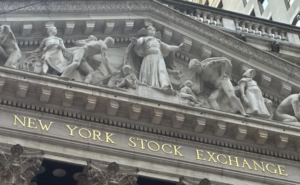U.S. stock futures were plunging in premarket trading following the implementation of massive U.S. tariffs on China, which led to China retaliating with a large tariff hike on U.S. imports. Oil prices dropped to their lowest point in over four years, and a significant sell-off in U.S. Treasuries caused bond yields to surge.
S&P 500 futures dropped 2% to 4,914.50, and if the losses persist, it could officially enter a bear market. Dow Jones futures fell 2.4%, and Nasdaq futures slumped 1.8%.
In contrast, Chinese markets saw a slight rebound, with the Shanghai Composite index rising by 1.3% and Hong Kong’s Hang Seng gaining 0.7%. This came after China responded with a retaliatory 84% tariff on U.S. goods in reaction to President Trump’s 104% tariffs that took effect at midnight.
China’s Ministry of Commerce issued a statement warning that if the U.S. continued to escalate trade restrictions, China would take further countermeasures. Chinese markets benefitted from large-scale share buybacks by state-run funds, which helped stabilize stock prices.
Meanwhile, in the U.S., oil prices dropped sharply. U.S. crude oil prices fell more than 5% to $56.38 per barrel, signaling growing concerns over economic slowdown. Similarly, Brent crude fell to $59.53 per barrel. Rapidly decreasing oil prices often signal pessimism about economic growth and potential recession.
U.S. Treasuries also saw a sell-off, with the yield on the 10-year Treasury note rising by 17 basis points to 4.44%, adding to the negative market sentiment surrounding Trump’s tariffs.
Delta Air Lines withdrew its 2025 forecast due to the uncertainty caused by the ongoing trade war, which is affecting business and consumer spending. Despite better-than-expected earnings for the most recent quarter, Delta’s stock remained mostly unchanged in premarket trading. The airline sector has been hit hard this year, with shares of major U.S. airlines like Delta down by 41%.
Pharmaceutical stocks also suffered following Trump’s announcement of tariffs on medicines to incentivize more domestic production. Pfizer and Merck each lost over 4%, with other major drugmakers such as Johnson & Johnson, Bristol Myers Squibb, and Eli Lilly seeing losses between 2% and 4%.
The global trade war, particularly between the U.S. and China, has left markets volatile, and analysts predict continued market swings as uncertainty looms over the duration of Trump’s tariffs. If the tariffs remain, economists fear they could lead to a recession. However, if negotiations result in a resolution and the tariffs are reduced quickly, the worst-case scenario might be avoided.
In Europe, markets extended their losses. Germany’s DAX dropped 4.1%, while France’s CAC 40 fell by 3.9%, and the UK’s FTSE 100 decreased by 3.8%. In Asia, Japan’s Nikkei 225 closed down 3.9%, and Taiwan’s Taiex led losses in Asia with a 5.8% drop. The sell-off affected major tech stocks, including TSMC and Hon Hai Precision Industry, with losses of 3.8% and 10%, respectively.
Other markets in Asia also saw declines, with India’s Sensex down by 0.5% and South Korea’s Kospi falling by 1.7%. Australia’s S&P/ASX 200 dropped 1.8%, and New Zealand’s shares also declined.














